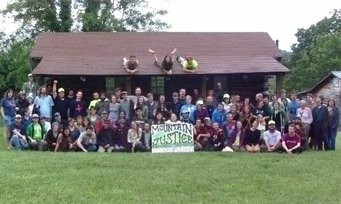
When I was a junior in college at Transylvania, I took an education course with Dr. JB -- here is where my memory may be a little creaky so fellow Transy folks, set me straight. Dr. B was a member of the local school board and was ultra ultra liberal. I on the other hand, at the time, wasn't sure where I stood about much of anything. So we did lots of cool exercises in this class -- you know, the kind where the professor asks an opinion/attitude type question and the students move to different corners of the room representing where they stand on the particular issue. I remember one question -- we were talking about some artists -- hippies back in the day -- who were being supported by welfare and the question asked was something like, "Should society support people who produce art but who don't have jobs or otherwise make money?" I remember moving to the corner of the room that probably represented "Somewhat disagree." I remember Dr. B looking at me with eyebrows raised.
A couple of days later, we were talking about our favorite books -- and I mentioned Atlas Shrugged, which I had just finished -- an epic, dramatic book with all kinds of political subtext which totally eluded me. Dr. B again looked at me, raised his eyebrows, and commented, "Why am I not surprised?" I was puzzled and a little hurt -- actually, I had no idea what he was talking about but his reaction did not seem positive and felt judgmental for reasons that I didn't understand. Looking back at that experience, I think he was indeed making judgments and assumptions about me, and what I wished he had next asked me -- and to my students if you are reading this, make sure that I ask this of you -- was WHY I liked the book.
What I think I would have said was that the characters in the book strove for excellence in what they did and were way big on independence. Again, I was 20 -- and I had just begun to really appreciate a couple of things. One -- I felt a real high, a sense of pleasure and satisfaction, when I excelled at or accomplished something -- a piece of music that took 9 months to master and memorize, an exam in genetics class, a thorny paper in sociology. It felt good. And two -- I was just realizing that, guess what, I was expected to become independent and self-supporting in a very short time, a pretty scary but at the same time exciting prospect. So of course, when I read Atlas Shrugged, the stuff about independence and achievement jumped out at me. And all of that other stuff about weak liberals who suck at the teat of the government fell away like chaff (insert sarcasm emoticon).
Why in the world am I remembering this now? I am not sure - but I think because, even while I still love to learn new things, to do well, to take care of myself, to be pretty independent, this is only part of the story. I of course did not follow Ayn Rand's philosophies when I chose to work as a psychologist with young children and adolescents and their families. I followed a calling that involved working toward excellence and a measure of independence, yes, but I also embraced a belief that I had something to give to others outside of myself, and a responsibility and need to do so.
And my experience at Mountain Justice poked at some other needs that often lie dormant in me, especially my very real need to be part of a community. A community with meaning.
My first night at Mountain Justice, I found myself elbow-deep in greasy dishwater, pre-rinsing dinner dishes before passing them on to the washer (Joe) and sterilizer (Jessica). Steve Earle blasted on somebody's iPod. The MJ folks, almost without exception, thanked me as they handed their dirty dishes to me through the pass-through window. Thanked me. I was hot and sweaty and smelly and sticky and tired after a first day of workshops related to organizing to fight mountain top removal. And I was happy.
I felt this way for 12-13 years when my children and I were part of a Unitarian Church community -- mostly when I was working with the kids and teenagers. When we had overnight lock-ins full of silliness and seriousness and song. When I watched the youth group plan and carry out, with only a little help, the annual ITALIAN DINNER (yes, that needs to be capitalized -- it was THAT important) that raised money for scholarships for other youth programs in the city. When I sat with the kids the Sunday after 9/11 and watched them grapple with the hugeness of what had just happened to their ideas about the world and fairness and safety. When I listened to middle-schoolers thoughtfully and energetically debate the question -- "Are the 10 commandments still relevant today?" And when I felt the anxiety and uncertainty of the youth who were soon-to-be-launched (was it their anxiety and uncertainty I felt, or ours, their parents'? hmmmm).
I often feel this way at work -- I am crazy about my work community of smart, funny, brave people who are committed to providing top-notch higher education. But I miss having an away-from-work community, particularly that special kind of community that is actively engaged with the bigness of life beyond ourselves in a way that is joyful and inspiring.
All day today, I have been reading Facebook updates from my new Mountain Justice friends involved with a big action today in D.C. -- many brave souls traveled to D.C. to attempt to meet with their Congress reps to urge them to support The Clean Water Protection Act (HB1375) and to fight to end mountain top removal -- and many more of us participated in a call-in day to our representatives to ask that they support the bill. Some activists have recently been able to testify before Congress -- Maria Gunnoe, winner of the 2009 Goldman Environmental Prize, spoke to the House Committee on Natural Resources. I encourage you to read Aaron Bady's column for his take on her talk -- and click on links in his article to see Maria's slides depicting MTR and describing its horrible effects on the entire ecosystem, including human health.
Several more folks shaved their heads in mourning for all that MTR has taken away from communities, continuing a symbolic action that began on Memorial Day in Charleston, WV. And a number of people from WV, VA, Tennessee, and Kentucky were arrested, including Stanley Sturgill, a veteran Kentucky deep-miner whose story is told by Jeff Biggers. Check out these amazing sites for more information... Appalachia Rising, iLoveMountains, Center for Biological Diversity.
Next week, I hope to travel with a group to Harrisburg, PA to talk to people about the importance of supporting clean air and clean water regulations, to ask that the energy companies engaged in fracking and mountain top removal clean up their acts.
I am a baby in this growing community, a baby (even though many of the folks are younger than me by 20-30 years). I feel privileged to begin my journey with this well-established community of very strong and grounded and wise citizens. A community focused on excellence - excellence in living with integrity and courage, and the best kind of independence - a self-sufficiency that is supported by interdependence with and generosity toward others.


 RSS Feed
RSS Feed
